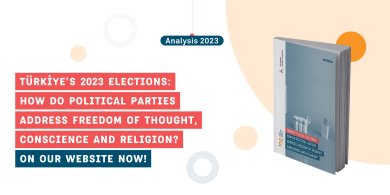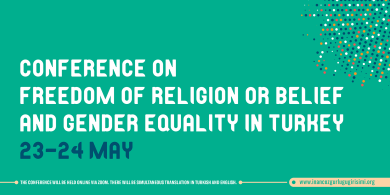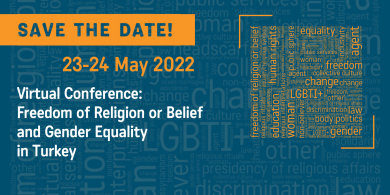“The Impact of the Covid-19 Pandemic on Freedom of Religion or Belief in Turkey” report is published!

The report presents a brief assessment of the Covid-19 restrictions’ impact on the right to freedom of religion or belief in Turkey.
Restrictions imposed by governments in response to the Covid-19 Pandemic have presented human rights challenges around the world. Public health interests had to be assessed as grounds for limitations in relation to several human rights including the right to freedom of religion or belief with significant consequences. Curfews, temporary closures, and measures limiting attendance in places of worship constituted some of the critical measures that amounted to restrictions on freedom of religion or belief.
The Impact of the Covid-19 Pandemic on Freedom of Religion or Belief in Turkey report presents a brief assessment of the nature of restrictions and their impact on the right to freedom of religion or belief in Turkey. The report is based on the monitoring of the relevant legal and administrative measures over the course of March 2020 until June 2021.
TO ACCESS THE FULL REPORT PLEASE CLICK HERE
The report describes,
- the nature of restrictions,
- curfews,
- measures such as closures of places of worship,
- limitations on the attendance of assemblies,
- and their implications for accessing places of worship, funerals, the collective activities of non-governmental organizations, including with religious intent,
- the exacerbation of inequalities,
- the gender impact of restrictions as well as the solidarity and new learning that took place within religious or belief communities.
The report finds that differentiated measures, including age related measures, impacted religious or belief communities differently. In the report, it is emphasized that deep systemic inequalities stemming from the allocation of public resources to mosques and their communities and not to other religious or belief communities, became even more apparent during the Pandemic. Furthermore, it is reported that women and girls had to stay at home and often lost the freedoms they had found outside the home in practising their religion or belief as well as other rights.
Furthermore, the report includes several good practices and concludes with concrete recommendations to public authorities, among others:
- When limitations are imposed on the right to manifest freedom of religion or belief and freedom of association, public authorities must ensure that these are prescribed by law, necessary in a democratic society, pursue a legitimate aim, proportionate, non-discriminatory and gender sensitive.
- When establishing differentiated restrictions and exemptions, public authorities must ensure that the practice of all religious or belief communities are considered in a gender and age sensitive manner.
- The impact of limitations on minority religious or belief communities must also be assessed.
- Measures should be taken only after broad consultation with all religious or belief communities in a gender sensitive manner.
- The authorities should take steps to tackle inequality by reforming the present system by which public funds and accommodation are provided only for Sunni Muslim religious services.




